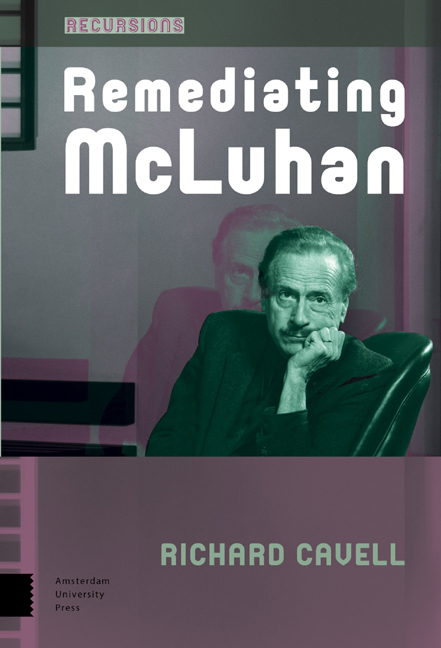Book contents
- Frontmatter
- Dedication
- Contents
- Introduction
- List of sigla
- I
- Re: Mediation
- 1 Beyond McLuhanism
- 2 McLuhan and the Question of the Book
- Embodiment as Incorporation
- 3 McLuhan and the Body as Medium
- 4 McLuhan, Tactility, and the Digital
- 5 Mechanical Brides and Vampire Squids
- Empathic Media
- 6 McLuhan: Motion: e-Motion: Towards a Soft Ontology of Media
- 7 Re-Mediating the Medium
- Determining Technology
- 8 McLuhan, Turing, and the Question of Determinism
- 9 Angels and Robots
- Being Mediated
- 10 Marshall McLuhan’s Echo-Criticism
- 11 McLuhan and the Technology of Being
- II
- 12 The Tragedy of Media: Nietzsche, McLuhan, Kittler
- Coda: On the 50th Anniversary of Understanding Media
- Notes
- Works Cited
- Index
6 - McLuhan: Motion: e-Motion: Towards a Soft Ontology of Media
Published online by Cambridge University Press: 12 December 2020
- Frontmatter
- Dedication
- Contents
- Introduction
- List of sigla
- I
- Re: Mediation
- 1 Beyond McLuhanism
- 2 McLuhan and the Question of the Book
- Embodiment as Incorporation
- 3 McLuhan and the Body as Medium
- 4 McLuhan, Tactility, and the Digital
- 5 Mechanical Brides and Vampire Squids
- Empathic Media
- 6 McLuhan: Motion: e-Motion: Towards a Soft Ontology of Media
- 7 Re-Mediating the Medium
- Determining Technology
- 8 McLuhan, Turing, and the Question of Determinism
- 9 Angels and Robots
- Being Mediated
- 10 Marshall McLuhan’s Echo-Criticism
- 11 McLuhan and the Technology of Being
- II
- 12 The Tragedy of Media: Nietzsche, McLuhan, Kittler
- Coda: On the 50th Anniversary of Understanding Media
- Notes
- Works Cited
- Index
Summary
All tools set forces in motion. […] The machine has not separated us from nature; through it we have discovered a new nature never before surmised.
El Lissitzky, ‘Nasci’, Merz 8-9 (1924)The new media are not bridges between man and nature: they are nature.
McLuhan, Counterblast (1969)The human lives in that it bodies [leibt], and thus it is admitted into the open of space, and through this self-admittance it holds itself already from the outset in a relation to its fellow humans and things.
Heidegger Kunst – Plastik – Raum (1964)While media theorists would agree on few fundamentals intrinsic to their field of study—starting with the definition of ‘media’—they would no doubt concur that media have an epistemological dimension. Whether it be McLuhan's notion of the media ‘environment’ (‘Educational Effects’, p. 402) or Kittler's concept of a ‘discourse network’, it can be argued that the effects of media are cognate with the Foucauldian episteme: they ‘determine’ our situation because they function in a Heideggerian manner as the pre-condition of what we can know and say (die Sprache spricht, nicht der Mensch) and they ‘are’ our situation (as Mitchell and Hansen would have it) because they operate ‘environmentally’ as our mediatic frame of reference.
But is it possible to speak of an ontology of media? Kittler addresses this question in his 2009 article ‘Towards an Ontology of Media’ by invoking, at the outset, McLuhan's 1971 comment that ‘“philosophy systematically excludes techne from its meditations. Only natural and living forms are classified as hylo-morphic”’ (quoted in Kittler, p. 25). Kittler argues that the Canadian media theorist gets Aristotle's metaphysics wrong: ‘[w]e have good reason to suppose, quite to the contrary, that form and matter are categories stemming originally from technical things and more or less forcibly transferred […] to natural ones’ (‘Ontology’, p. 25). Kittler grants priority to technology rather than nature, arguing that McLuhan was suggesting the opposite. In fact, McLuhan is arguing that technology is nature: ‘[t]he literate Greeks abstracted visual order out of preliterate oral chaos and called their artifact “Nature” (phusis). […] In today's electric world, man becomes aware that this artificial “Nature” of the Greeks is an extension of himself, just as he is an extension of nature.’ Kittler acknowledges that ‘McLuhan's curious philological error,’ however, becomes ‘a historical truth.
- Type
- Chapter
- Information
- Remediating McLuhan , pp. 67 - 78Publisher: Amsterdam University PressPrint publication year: 2016



